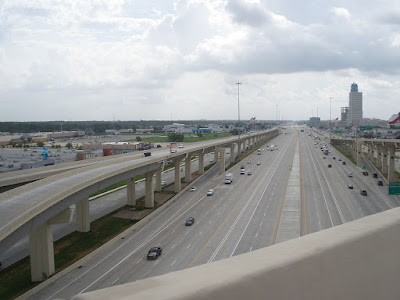 |
| Port Gardner Bay as viewed from Rucker Hill in Everett. |
When it comes to following Jesus, what does a wide open door look like? As a Christian, what does it look like when you are walking in the direction that the Savior wants you to walk? What should you experience as you travel down the correct path?
In churches around the country you will hear people talk about an "open door" that has led them to make a decision about their life. Usually that open door implies that the path was made easy or obvious to them, so they are following it. It might be the provision of a new job, an easier way to purchase a new house or rent a new apartment. It sometimes is the path that leads to another city, church, or ministry. These open doors imply changes in one's life.
However, we have to return to the question about the door itself and the path that lies just beyond it. What does that look like?
Here's what the Apostle Paul said about it.
1 Corinthians 16:5-9New Living Translation (NLT)
Paul’s Final Instructions
5 I am coming to visit you after I
have been to Macedonia,[a]
for I am planning to travel through Macedonia. 6 Perhaps I will stay awhile with you, possibly all winter,
and then you can send me on my way to my next destination. 7 This time I don’t want to make just
a short visit and then go right on. I want to come and stay awhile, if the Lord
will let me. 8 In the meantime,
I will be staying here at Ephesus until the Festival of Pentecost. 9 There is a wide-open door for a
great work here, although many oppose me.
According to Paul, the wide-open door is one that is guarded by the opposition. To walk through this door will mean pain, discouragement, threats of death, and mental anguish. How in the world can Paul describe such a thing as an open-door?
First, we have to distinguish between what the American Church perceives as difficulties and persecution versus what Paul was describing as opposition. Many in the American Church believe persecution and opposition means that they had a bad day. Someone said something that they didn't like and it put them in a bad mood for the day. Or, perhaps they didn't get the parking space they wanted, their coffee wasn't ready when they woke up, they have more bills than money, or their car wouldn't start. Many in the American Church feel that opposition happens when we don't get what we want when we want. Surely, they say, this is spiritual opposition!
Paul's experience with opposition was quite different than what our insulated society has ever seen. Here's what he said.
2 Corinthians 11:24-27 I know I sound like a madman, but I have
served him far more! I have worked harder, been put in prison more often,
been whipped times without number, and faced death again and again. 24 Five different times the
Jewish leaders gave me thirty-nine lashes. 25 Three times I was beaten with
rods. Once I was stoned. Three times I was shipwrecked. Once I spent a
whole night and a day adrift at sea. 26 I have traveled on many long
journeys. I have faced danger from rivers and from robbers. I have faced
danger from my own people, the Jews, as well as from the Gentiles. I have
faced danger in the cities, in the deserts, and on the seas. And I have
faced danger from men who claim to be believers but are not.[c] 27 I have worked hard and long,
enduring many sleepless nights. I have been hungry and thirsty and have
often gone without food. I have shivered in the cold, without enough
clothing to keep me warm.
"I got beaten again yesterday and barely survived. God must not be in this thing."
"Yet another false believer has created division in this church and also hurt my feelings. Since this keeps happening, I must not be going the right way."
"Another shipwreck? Really?? My body is so tired! Maybe it's a sign to turn around. That I'm pushing too hard."
You don't read any of those words in the Bible, because Paul didn't write them and he certainly didn't believe them. In fact, Paul indicated in the passage above that his impression of "many opposing me" meant that he in fact was going in the correct direction!
So what insight does Paul give us about open doors as a Christian? First, open doors indicate a difficult path. If you have followed this blog very long you might recognize that as a pattern, but you have to look deeper than the surface level. There was an open door for us to move to Seattle and the Lord was absolutely in it. The path cleared in a mere 3 months and we were gone. What we discovered as we crossed the threshold of the open door, however, was difficulty, sorrow, and pain. A move is celebrated before you make the move, but when you actually arrive and realize your aloneness, and when you experience the spiritual hardness of the new place and the lack of interest in Jesus, the path becomes much more difficult.
Paul actually had a keen understanding of why open doors are the gateway to a difficult path. In fact, his perspective was quite unique because before becoming a follower of Jesus, he WAS part of the opposition!
Acts 8:2-3
Saul
was one of the witnesses, and he agreed completely with the killing of Stephen.
A
great wave of persecution began that day, sweeping over the church in
Jerusalem; and all the believers except the apostles were scattered through the
regions of Judea and Samaria. 2 (Some
devout men came and buried Stephen with great mourning.) 3 But Saul was going everywhere to
destroy the church. He went from house to house, dragging out both men and
women to throw them into prison.
And yet even in the middle of the opposition that Saul was stirring up against the new Church, the Lord was able to use that for good. If you read further in the same passage, you see this.
Picks
up with vs. 4: But the believers who
were scattered preached the Good News about Jesus wherever they went. 5 Philip, for example, went to the
city of Samaria and told the people there about the Messiah. 6 Crowds listened intently to Philip
because they were eager to hear his message and see the miraculous signs he
did. 7 Many evil[a]
spirits were cast out, screaming as they left their victims. And many who had
been paralyzed or lame were healed. 8 So
there was great joy in that city.
You mean to tell me that these new believers who were excited to teach others about Jesus, who were now fleeing for their lives from this guy Saul, actually were experiencing an open door? Experiencing danger and opposition as a Christian might actually mean the door is open? On the surface it seems implausible, but then one has to examine the fruit that was produced by this opposition. Did you see it?
The Gospel was preached because Saul chased them to different cities.
Crowds listened intently to the message.
Evil spirits were cast out.
The sick were healed.
There was great joy in the city.
That's what Jesus is able to do. He can take bad situations and turn them around for good. He can take situations that might bring discouragement and turn them into something that brings great joy. He can actually use things intended for evil and make them turn out for good. To be clear, I'm sure the believers were not experiencing a cake-walk in their lives at the time. They probably were tired from constantly being on the run during persecution. I'm sure they experienced fear that they might be caught. It is probable that they had moments of discouragement while on the run or hiding. And yet, they seemed to know what Paul later knew, that there was an open door in their cities to teach about Jesus, and they were actively walking through that open door.
So what can you take from all of this and apply to your life? We can go to one of the teachings of Jesus Himself for a good summary on that.
Matthew 7:13
The Narrow Gate
13 “You can enter God’s Kingdom only
through the narrow gate. The highway to hell[f]
is broad, and its gate is wide for the many who choose that way. 14 But the gateway to life is very
narrow and the road is difficult, and only a few ever find it.
I have long believed that you can have confirmation on the right way to go about life by observing what the rest of the world does and deliberately traveling in the opposite direction. The wrong path as a follower of Jesus actually looks like Interstate 10 in parts of Houston. The road is extremely wide with many lanes and a whole lot of people are going that way. Don't go down that path.
The path that Jesus describes is one that winds around. This path probably is steep, and may have thorns that will scratch you as you climb. This path also is narrow because there aren't many people traveling that way, and it undoubtedly is not well marked. However, that path leads to the only thing in this life or the next that actually matters, and that is Jesus Himself. Knowing Him or not knowing Him has dramatic implications for eternity.
Many American Christians don't really want this kind of religion. If it's difficult and painful, we want to avoid that sort of thing. Let me suggest that if that is the case for you, Christianity probably isn't what you want. There are a lot of other religions out there that claim to be the path to prosperity and success, or inner peace and comfort. Christianity doesn't claim to be that, in spite of what is preached from many pulpits today. But know this: all of those other proclaimed pathways lead to death. They may make you feel good about yourself now, and may seem easy and right today, but on the day you die, you will realize how wrong you actually were. And when you make that realization, it will be too late to do anything about it.
C.S. Lewis said it best about what the Lord is actually trying to do in you through the difficulties and persecutions you experience along the way as a Christian.
Imagine yourself as
a living house. God comes in to rebuild that house. At first, perhaps, you can
understand what He is doing. He is getting the drains right and stopping the
leaks in the roof and so on; you knew that those jobs needed doing and so you are
not surprised. But presently He starts knocking the house about in a way that
hurts abominably and does not seem to make any sense. What on earth is He up
to? The explanation is that He is building quite a different house from the one
you thought of - throwing out a new wing here, putting on an extra floor there,
running up towers, making courtyards. You thought you were being made into a
decent little cottage: but He is building a palace. He intends to come and live
in it Himself.
What the Savior wants to do in you is to make a dwelling place for Himself, that He would live in and through you as you walk the narrow path of this life toward eternity with Him. That is true love.


